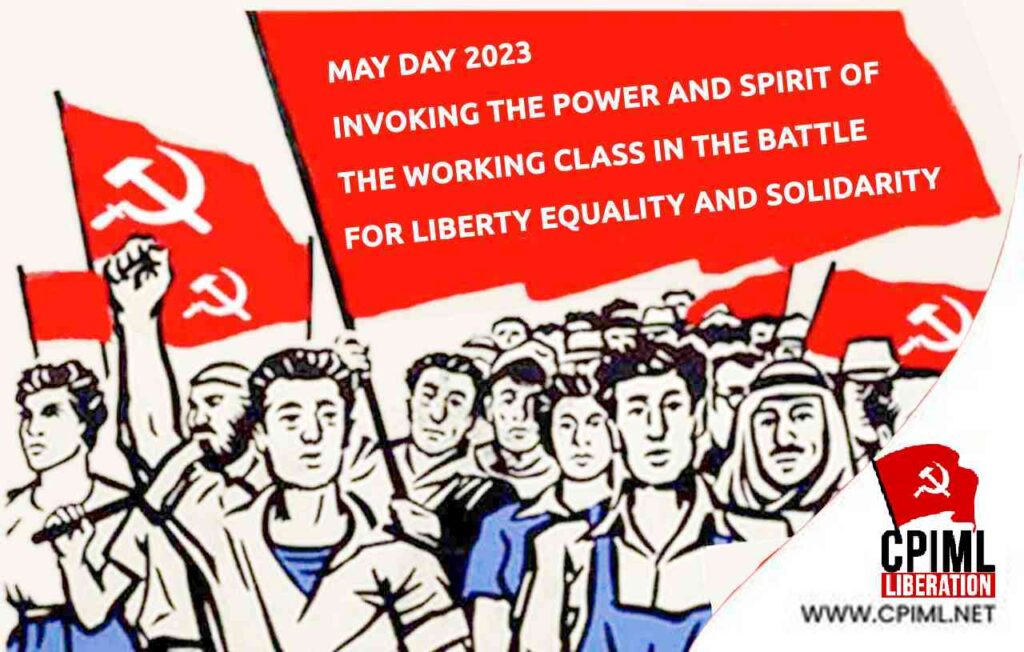By Krishna Jha
The occasion of May Day, observed on May 1 by crores of workers and young people across the globe as a day of international working-class solidarity, necessitates a reassessment of our collective objectives in the context of an escalating global crisis of capitalism.
Throughout more than a hundred years, countless individuals have consistently voiced their resolve to eradicate oppression, war, and poverty. The triumph of the Russian working class in October 1917 constituted a substantial advancement in the struggle for the socialist transformation of society, serving as an inspiration to workers internationally.
Today, internationalism has never been so relevant. As global capitalism extends its fields of exploitation, so workers are forced to get organised to defend themselves throughout the world. The frequent shocks the stock markets are suffering in different parts of the world – both developed and underdeveloped – are a reflection of the crisis affecting world capitalism.
As the crisis intensifies, it becomes increasingly vital for workers to equip themselves with a programme that addresses their needs and aspirations. In this process, they must reclaim May Day’s legacy of struggle.
The struggle for the 8-hour working day in the United States during the 1880s was the foundational fight that gave rise to May Day as International Labour Day. In 1884, the Convention of the Federation of Organised Trades played a crucial role by raising a resolution – a beacon for the working class – demanding that ‘8 hours shall constitute a legal day’s labour from and after 1st May 1886.’ This demand was embraced by the Labour movement, leading to the formation of Eight Hour Leagues, which successfully extracted significant concessions from employers and doubled trade union membership.
The 25,000-strong May Day rally in Chicago marked a pivotal moment, prompting employers to aggressively suppress the burgeoning militant labour movement. This suppression turned deadly two days later when police fired upon and killed striking workers. The subsequent bombing, attributed to an agent provocateur, which killed seven police officers, led to further brutal retaliation against workers, with numerous shootings and hundreds injured. The ensuing weeks were characterized by systematic police raids on strikers and trade unionists, violently disrupting their assemblies. Labour leaders were unjustly accused and sentenced to death, a verdict later commuted to life imprisonment.
This tragic sequence of events in Chicago in May 1886 became enshrined as the origin of International Workers’ Day. In 1889, driven by the ideal of workers’ internationalism, worker representatives established the Second International. A central tenet of this organization was the resolution that on each May Day, workers in every nation would engage in strikes and demonstrations to demand the 8-hour workday.
The call to action resonated widely. On May 1t, 1890, workers throughout Europe mobilized: 100,000 demonstrated in Barcelona, 120,000 in Stockholm, and 8,000 in Warsaw. Despite bans on demonstrations in Austria and Hungary, thousands of workers stayed home in protest. Strikes also spread across Italy and France, tragically resulting in the deaths of ten workers in Northern France.
The fight for the 8-hour day has tragically claimed the lives of many workers in the years since. We rightly celebrate these long years of working-class struggle and resistance on this day. Yet, mere celebration is not enough.
Unfortunately, the working class is still bound by the chains of world capitalism. The repeated attempts by workers to fundamentally change society have been hampered every time. Hence today we also celebrate class resistance. The crucial task of regenerating the labour and trade union movement is inseparable from the struggle for socialist policies. It is imperative that a clear alternative to capitalist policies is advanced within the workers’ movement.
In India, the livelihood and working conditions of workers have come under relentless attack in the last ten years of the Bharatiya Janata Party government. During this period, the hard won rights of the workers are sought to be curtailed so as to facilitate their unbridled exploitation by the big corporate. The Narendra Modi government has subsumed the existing labour laws into four labour codes. While not yet notified, the Labour Codes are Code on Wages, Code on Industrial Relations, Code on Social Security and Code on Occupational Safety, Health and Working Conditions. Though the government claims that the new codes would simplify and modernize the labour laws, the fact of the matter is that they would simply take away all the benefits the working class has won through its struggle so far.
The code on wages, for example, does not provide universal minimum wage as different thresholds are applied for different areas. The code on occupational safety, health and working conditions enables increase in working hours to 12 a day. The contract workers and migrant workers are the worst to be affected as this code seeks to subsume the Inter State Migrant Workmen’s Act which provides some protection to the migrant workers. Similarly, the code on industrial relations deprives the basic rights of workers to organize and involve in collective action. This code will make the registration of trade unions even more difficult. The fourth code, the code on social security, would make even the existing social security rights provisions for large sections of workers uncertain. This code has no concrete social security scheme, nor are the necessary resources provided. These labour codes are meant to ensure “ease of doing business” for the big corporate, and this is sought to be achieved by attacking the existing hard won basic rights of the workers and enabling their unbridled exploitation.
We must begin to reclaim May Day’s hidden past in an effort to create a real fighting alternative. May Day is our day. In the words of the Communist Manifesto: “Workers of the World Unite!” (IPA Service)




 Reasons Why Gold Is The New Diamond: A Joy Forever
Reasons Why Gold Is The New Diamond: A Joy Forever 